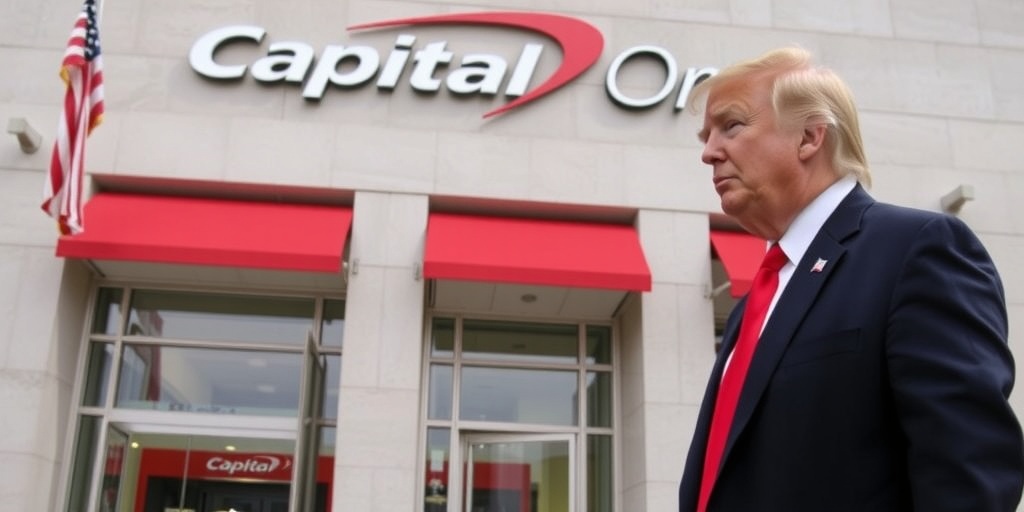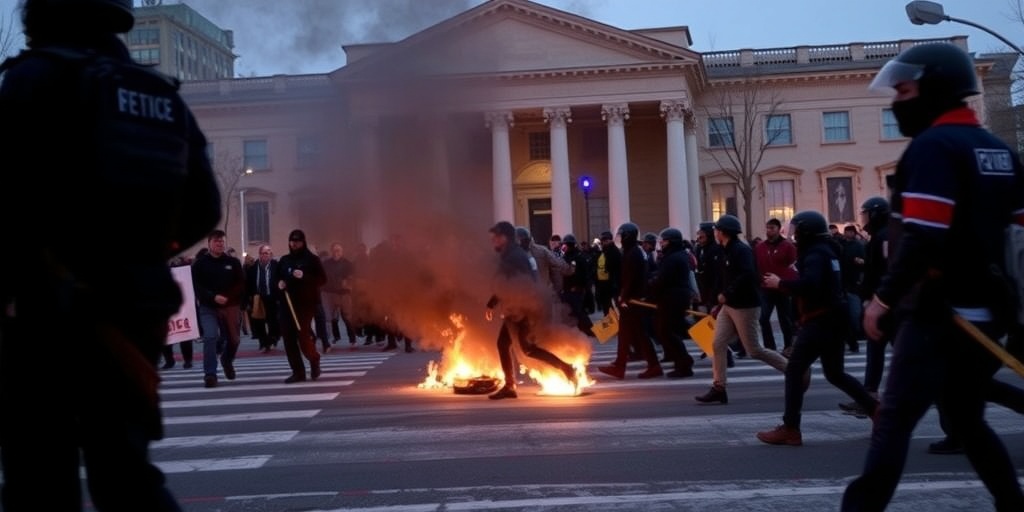Now Reading: Trump Organization Sues Capital One Over Account Closure
-
01
Trump Organization Sues Capital One Over Account Closure
Trump Organization Sues Capital One Over Account Closure

Trump Organization Files Lawsuit Against Capital One Over Account Terminations
In a notable legal development, the Trump Organization has filed a lawsuit against Capital One, accusing the financial institution of “unjustifiably terminating” over 300 accounts linked to the family’s businesses. This lawsuit, lodged in state court in Florida, is a direct response to the bank’s decision to close its accounts in June 2021, following the January 6 attack on the U.S. Capitol by supporters of former President Donald Trump. This legal action indicates an ongoing trend of retaliation from Trump and his associates against those perceived to have distanced themselves from him.
The complaint states that Capital One’s abrupt closure of the accounts not only undermined the Trump Organization’s financial stability but also harmed numerous related businesses and their employees. The lawsuit claims that millions of dollars were held in these accounts at the time they were closed, and seeks accountability for the significant damages incurred by the organization and the many "dozens of properties, hundreds of tenants, and thousands of Trump Organization employees" who depend on these accounts for their livelihoods.
The implications of this legal action could extend beyond just Capital One. Following the Capitol riot, many financial institutions severed ties with the Trump Organization, signaling a broader trend of caution among banks and companies associated with the former president. Eric Trump, one of the plaintiffs and the leader of the Trump Organization, hinted at a possible wave of similar actions against other financial institutions, stating, “More to come” in a recent statement.
This lawsuit arrives at a time when Trump has intensified efforts to confront individuals and entities that he views as adversaries. Since reclaiming a prominent political position, Trump has acted on various fronts, including revoking security details for critics and targeting attorneys representing those involved in investigations against him, such as special counsel Jack Smith.
The timing of the lawsuit also shines a light on the Trump Organization’s renewed ambition following a period marked by political and legal turmoil. The company, which faced criticism and scrutiny over its dealings, particularly after a tax fraud conviction in New York, has recently resumed its expansion efforts. Over the past year, the organization has announced several new hotel deals, some in countries integral to U.S. foreign policy, which raises potential conflict of interest questions regarding Trump’s dual roles as a businessman and president.
Complicating matters further, the lawsuit against Capital One raises concerns regarding potential conflicts of interest for the Trump administration. Capital One, as a regulated bank, falls under the purview of federal oversight, and Trump’s family business suing the bank could lead to complications in regulatory contexts. Additionally, the Trump administration had previously dropped a lawsuit against Capital One alleging that the bank had defrauded customers out of $2 billion in savings account interest payments, raising further questions about the relationship between the Trump Organization and the banking institution.
The Trump Organization’s lawsuit claims that Capital One’s decision to close the accounts was influenced by “political and social motivations,” accusing the bank of acting on “unsubstantiated, ‘woke’ beliefs.” The lawsuit suggests that Capital One made the decision to “de-bank” the Trump family accounts in response to the prevailing political climate, which they assert favored distancing from conservative views associated with Trump.
In response to the allegations, a spokesperson for Capital One firmly denied the claims, stating that the bank “has not and does not close customer accounts for political reasons.” The bank maintains its position on the matter while facing scrutiny over its handling of the Trump Organization’s accounts.
This legal battle illustrates not only the personal stakes for Trump and his allies but also the broader implications for financial institutions navigating their relationships with high-profile clients, particularly in a politically charged environment. As the Trump Organization seeks to reclaim its financial footing and reestablish itself as a key player in the real estate market, the resolution of this lawsuit and any subsequent actions against other banks will be closely watched by both supporters and critics alike.
As the political landscape continues to evolve, this case could set a precedent for how businesses and financial institutions handle client relationships in the context of political affiliations and actions, potentially reshaping the way corporations engage with prominent political figures.
Stay Informed With the Latest & Most Important News
Previous Post
Next Post
-
 01New technology breakthrough has everyone talking right now
01New technology breakthrough has everyone talking right now -
 02Unbelievable life hack everyone needs to try today
02Unbelievable life hack everyone needs to try today -
 03Fascinating discovery found buried deep beneath the ocean
03Fascinating discovery found buried deep beneath the ocean -
 04Man invents genius device that solves everyday problems
04Man invents genius device that solves everyday problems -
 05Shocking discovery that changes what we know forever
05Shocking discovery that changes what we know forever -
 06Internet goes wild over celebrity’s unexpected fashion choice
06Internet goes wild over celebrity’s unexpected fashion choice -
 07Rare animal sighting stuns scientists and wildlife lovers
07Rare animal sighting stuns scientists and wildlife lovers





















